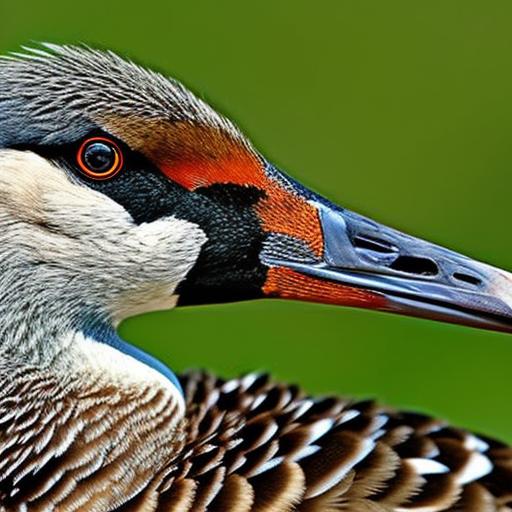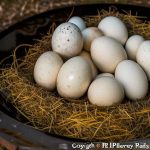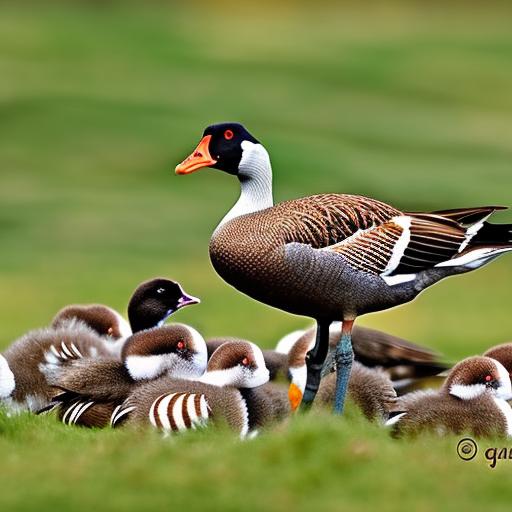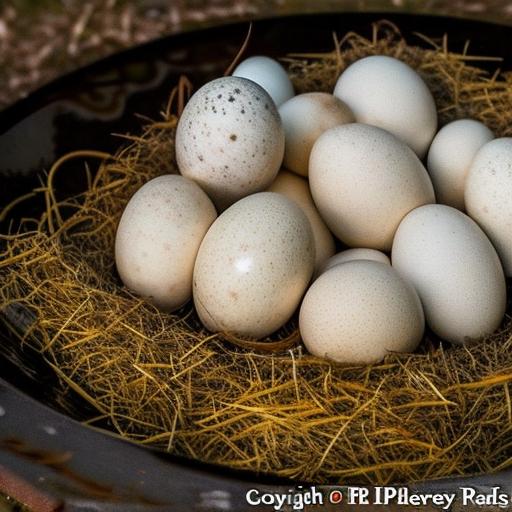Geese are a popular domesticated bird that are commonly found on farms and in rural areas. While there are many different breeds of geese, some are considered rare and unique. These rare geese breeds have distinct characteristics and features that set them apart from the more common breeds. They are often sought after by farmers and breeders for their beauty, rarity, and unique qualities.
Rare geese breeds can vary greatly in appearance, size, and temperament. Some breeds have striking color patterns, such as the Sebastopol goose with its curly feathers or the African goose with its bold black and white markings. Others have unique physical features, such as the Chinese goose with its prominent knob on its bill or the Pilgrim goose with its sex-linked feather coloration. These rare breeds also tend to have different temperaments and behaviors compared to more common breeds, making them fascinating to observe and interact with.
Key Takeaways
- Rare geese breeds are unique due to their distinct physical features and characteristics.
- Preserving rare geese breeds is important for future generations to maintain genetic diversity and prevent extinction.
- The history of rare geese breeds dates back centuries and includes various cultural and geographical influences.
- Rare geese breeds have different physical features, such as feather color and body size, that make them stand out from other breeds.
- Rare geese breeds play a significant role in agriculture and farming, including meat and egg production and pest control.
The Importance of Preserving Rare Geese Breeds for Future Generations
Preserving genetic diversity is crucial for the long-term health and sustainability of any species, including domesticated animals like geese. Rare geese breeds play a vital role in maintaining this diversity within the goose population. By preserving these rare breeds, we ensure that future generations will have access to a wide range of genetic traits and characteristics.
Rare geese breeds contribute to genetic diversity by possessing unique genes that may not be present in more common breeds. These genes can be valuable for breeding programs aimed at improving certain traits or characteristics in geese. Additionally, rare breeds often have adaptations that make them well-suited to specific environments or climates, which can be important for future breeding efforts in the face of changing environmental conditions.
Preserving rare geese breeds is also important for cultural and historical reasons. Many of these breeds have a long history and are deeply rooted in certain regions or countries. Losing these breeds would mean losing a part of our agricultural heritage and the knowledge and skills associated with raising and breeding them.
The Fascinating History of Rare Geese Breeds and Their Origins
The domestication of geese dates back thousands of years, with evidence of their presence in ancient Egyptian and Roman civilizations. Geese were initially domesticated for their meat, eggs, feathers, and down. Over time, different breeds were developed to suit specific purposes and environments.
The origins of rare geese breeds can be traced back to specific regions or countries where they were first developed. For example, the African goose is believed to have originated in Africa, while the Pilgrim goose was developed in the United States. These breeds were often created through selective breeding, with farmers and breeders choosing individuals with desired traits to reproduce.
Rare geese breeds have evolved over time through natural selection and human intervention. They have adapted to different climates, landscapes, and farming practices. Some breeds have been bred for specific purposes, such as the Toulouse goose which is known for its large size and meat production. Others have been bred for their ornamental value, such as the Sebastopol goose with its unique feather curling.
Characteristics and Physical Features of Rare Geese Breeds
Rare geese breeds exhibit a wide range of physical features and characteristics that make them unique and valuable. These features can include feather coloration, size, body shape, bill shape, and temperament.
Feather coloration is one of the most striking features of rare geese breeds. Some breeds have bold black and white markings, such as the African goose or the Chinese goose. Others have more subtle color patterns, such as the Pilgrim goose which has sex-linked feather coloration that allows males and females to be easily distinguished.
Size is another important characteristic of rare geese breeds. Some breeds are larger in size, such as the Toulouse goose which is known for its meat production. Others are smaller and more compact, such as the Egyptian goose which is often kept for ornamental purposes.
Bill shape is also a distinguishing feature of rare geese breeds. The Chinese goose, for example, has a prominent knob on its bill that sets it apart from other breeds. This knob is believed to have evolved through selective breeding for ornamental purposes.
Temperament can vary greatly among rare geese breeds. Some breeds are known for their docile and friendly nature, while others can be more aggressive or territorial. It is important to consider the temperament of a breed when choosing geese for breeding or as pets.
The Role of Rare Geese Breeds in Agriculture and Farming
Rare geese breeds play a variety of roles in agriculture and farming practices. They are valued for their meat, eggs, feathers, down, and as ornamental birds.
Meat production is one of the primary roles of geese in agriculture. Some rare breeds, such as the Toulouse goose, are specifically bred for their large size and meat quality. Their meat is known for its rich flavor and tenderness, making it highly sought after by chefs and consumers.
Egg production is another important role of geese in farming. Geese eggs are larger than chicken eggs and have a rich flavor that is prized by many. Some rare breeds, such as the African goose, are known for their high egg production and are often kept specifically for this purpose.
Feathers and down from geese are highly valued for their warmth and insulation properties. They are used in the production of pillows, comforters, and clothing items. Some rare breeds, such as the Pilgrim goose, have unique feather coloration that adds to their value in the feather industry.
Ornamental geese breeds are also popular in farming and agriculture. These breeds are kept for their beauty and aesthetic appeal rather than for their meat or egg production. They are often used in landscaping or as show birds in exhibitions and competitions.
Challenges Faced in Breeding and Raising Rare Geese Breeds

Breeding and raising rare geese breeds can come with its own set of challenges. These challenges can include finding quality breeding stock, maintaining genetic diversity, and ensuring proper care and management practices.
Finding quality breeding stock can be difficult for rare geese breeds. Since these breeds are not as common as more popular breeds, it can be challenging to find reputable breeders who have healthy and well-bred birds. It is important to do thorough research and seek recommendations from experienced breeders when looking to acquire rare geese breeds.
Maintaining genetic diversity is crucial for the long-term health and sustainability of rare geese breeds. Inbreeding can lead to a loss of genetic diversity and an increased risk of genetic disorders or health problems. Breeders must carefully manage their breeding programs to ensure that genetic diversity is maintained through the selection of unrelated individuals for breeding.
Proper care and management practices are essential for the health and well-being of rare geese breeds. They require appropriate housing, feeding, and healthcare to thrive. It is important to provide them with a suitable environment that meets their specific needs, such as access to water for swimming and grazing areas for foraging.
The Top 5 Rare Geese Breeds You Need to Know About
1. African Goose: The African goose is a large breed known for its striking black and white markings. It is highly valued for its high egg production and meat quality. This breed is also known for its friendly and docile temperament, making it a popular choice for both farming and as pets.
2. Sebastopol Goose: The Sebastopol goose is famous for its unique feather curling, which gives it a fluffy and elegant appearance. This breed is highly sought after by collectors and enthusiasts for its ornamental value. It is known for its calm and gentle nature, making it a popular choice for those looking for a beautiful and friendly bird.
3. Pilgrim Goose: The Pilgrim goose is a rare breed that is known for its sex-linked feather coloration. This means that males and females can be easily distinguished by their feather color, making it convenient for breeding purposes. This breed is also valued for its meat production and friendly temperament.
4. Chinese Goose: The Chinese goose is easily recognizable by the prominent knob on its bill. This breed is highly valued for its ornamental value and is often kept for landscaping purposes. It is known for its alert and protective nature, making it a good choice for guarding properties or as a watchful companion.
5. Toulouse Goose: The Toulouse goose is one of the largest domesticated goose breeds. It is known for its meat production and is highly valued for its flavorful and tender meat. This breed has a calm and docile temperament, making it easy to handle and manage.
How to Care for Rare Geese Breeds: Feeding, Housing, and Health Considerations
Caring for rare geese breeds requires attention to their specific needs in terms of feeding, housing, and health considerations.
Feeding: Rare geese breeds have similar dietary requirements to other geese breeds. They should be provided with a balanced diet that includes a mix of grains, greens, and protein sources. Fresh water should always be available for drinking and swimming.
Housing: Rare geese breeds require suitable housing that provides protection from predators, extreme weather conditions, and adequate space to move around. A secure enclosure with access to water for swimming is essential. Bedding material should be provided to keep the birds comfortable and to absorb waste.
Health Considerations: Regular health checks are important to ensure the well-being of rare geese breeds. Vaccinations and deworming should be carried out as recommended by a veterinarian. Proper hygiene practices, such as regular cleaning of the housing area and providing clean water, are essential to prevent the spread of diseases.
The Growing Demand for Rare Geese Breeds in the Poultry Industry
There is a growing demand for rare geese breeds in the poultry industry due to their unique characteristics and qualities. These breeds are being used in various industries, including meat production, egg production, feather production, and as ornamental birds.
Rare geese breeds are valued for their meat quality and flavor. Their large size and tender meat make them a popular choice among consumers and chefs. The demand for high-quality, locally sourced meat has increased in recent years, leading to an increased interest in rare geese breeds for meat production.
Egg production is another area where rare geese breeds are in demand. Their large eggs with rich flavor are highly sought after by consumers who appreciate the unique taste and nutritional value of goose eggs. Some rare breeds, such as the African goose, are known for their high egg production and are specifically bred for this purpose.
Feathers and down from rare geese breeds are used in various industries, including bedding, clothing, and insulation. The unique feather coloration and patterns of some rare breeds add to their value in the feather industry. Collectors and enthusiasts also seek out rare geese breeds for their ornamental value.
Why Rare Geese Breeds are Worth the Investment
Rare geese breeds are unique and valuable for their distinct characteristics, genetic diversity, historical significance, and contributions to various industries. Preserving these breeds is important for maintaining genetic diversity within the goose population and ensuring the long-term health and sustainability of domesticated geese.
Investing in rare geese breeds can be rewarding both financially and personally. These breeds offer opportunities for meat production, egg production, feather production, and as ornamental birds. They provide a unique and valuable addition to any farm or agricultural enterprise.
By understanding the history, characteristics, and care requirements of rare geese breeds, farmers and breeders can make informed decisions about which breeds to invest in and how to properly care for them. With proper breeding and raising practices, rare geese breeds can thrive and continue to contribute to the agricultural industry for generations to come.
If you’re interested in rare geese breeds, you might also enjoy reading about the importance of a well-designed chicken coop. The Chicken Coop Country Diner offers valuable insights into creating a comfortable and functional space for your feathered friends. Check out this informative article at https://poultrywizard.com/keeping-chickens/the-chicken-coop-country-diner/.
FAQs
What are rare geese breeds?
Rare geese breeds are breeds of geese that are not commonly found or raised in large numbers. These breeds may have unique physical characteristics, temperaments, or purposes.
What are some examples of rare geese breeds?
Examples of rare geese breeds include the African goose, the Pilgrim goose, the Sebastopol goose, the Steinbacher goose, and the Toulouse goose.
Why are rare geese breeds important?
Rare geese breeds are important for genetic diversity and preservation of the species. They may also have unique traits that make them valuable for specific purposes, such as meat production or egg laying.
Where can I find rare geese breeds?
Rare geese breeds can be found through specialty breeders, online marketplaces, and agricultural shows and exhibitions. It is important to research and choose a reputable breeder to ensure the health and quality of the geese.
What should I consider before raising rare geese breeds?
Before raising rare geese breeds, it is important to consider the space and resources needed for their care, as well as any local regulations or restrictions on raising geese. It is also important to research the specific needs and characteristics of the breed to ensure proper care and management.
Meet Walter, the feathered-friend fanatic of Florida! Nestled in the sunshine state, Walter struts through life with his feathered companions, clucking his way to happiness. With a coop that’s fancier than a five-star hotel, he’s the Don Juan of the chicken world. When he’s not teaching his hens to do the cha-cha, you’ll find him in a heated debate with his prized rooster, Sir Clucks-a-Lot. Walter’s poultry passion is no yolk; he’s the sunny-side-up guy you never knew you needed in your flock of friends!






